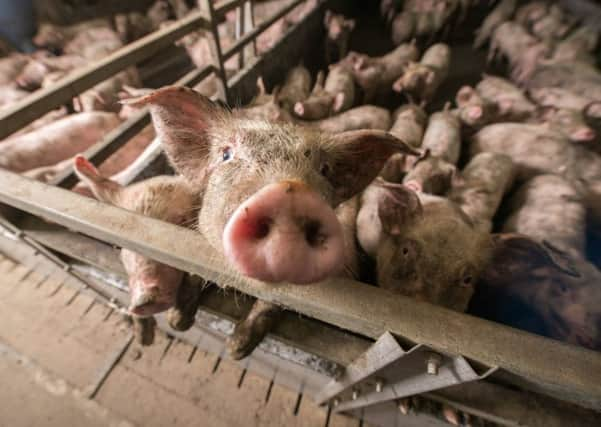Ground breaking capital scientists save pigs' bacon


Porcine Reproductive and Respiratory Syndrome (PRRS) costs the pig industry around £1.75 billion each year in lost revenue in the US and Europe alone.
The disease causes breathing problems and deaths in young animals and if pregnant sows become infected, it can cause them to lose their litter.
Advertisement
Hide AdAdvertisement
Hide AdThe virus infects pigs using a receptor on their cells’ surface called CD163. Researchers at the University of Edinburgh’s Roslin Institute used gene editing techniques to remove a small section of the CD163 gene. The tests for the virus show the pigs have not become infected at all while the animals show no signs that the change in their DNA has had any other impact on their health or wellbeing.
Dr Christine Tait-Burkard said: “These results are exciting but it will still likely be several years before we’re eating bacon sandwiches from PRRS-resistant pigs. First and foremost we need broader public discussion on the acceptability of gene-edited meat entering our food chain, to help inform political leaders on how these techniques should be regulated.
“We also need to carry out longer term studies to confirm that these genetic changes do not have any unforeseen adverse effects on the animals.
“If these studies are successful and the public are accepting of this technology, we would then be looking to work with pig breeding companies to integrate these gene edits into commercial breeding stocks.”
Advertisement
Hide AdAdvertisement
Hide AdThe team collaborated with Genus PLC, a leading global animal genetics company, to produce pigs with the specific DNA change. Previous studies had shown that cells from these animals were resistant to the virus in lab tests. This is the first time researchers have exposed these pigs to the virus to see if they become infected.
Jonathan Lightner, chief scientific officer for Genus PLC said: “These results are very exciting and further underscore the potential, through gene editing, to provide incredible benefits to the global pork industry, and society as a whole, by improving animal health. We look forward to further collaboration with the University on this project.”
Genetically modified animals are banned from the food chain in Europe. It is not clear what regulations would apply to gene-edited animals, however, as the approach is different.
Jef Grainger, associate director of BBSRC Science Strategy, said: “This is an exciting result that demonstrates the potential for genome editing approaches to enable significant improvements to be made in the health and welfare of farmed animals, and reduce the economic impacts of diseases that are otherwise difficult to manage effectively.”